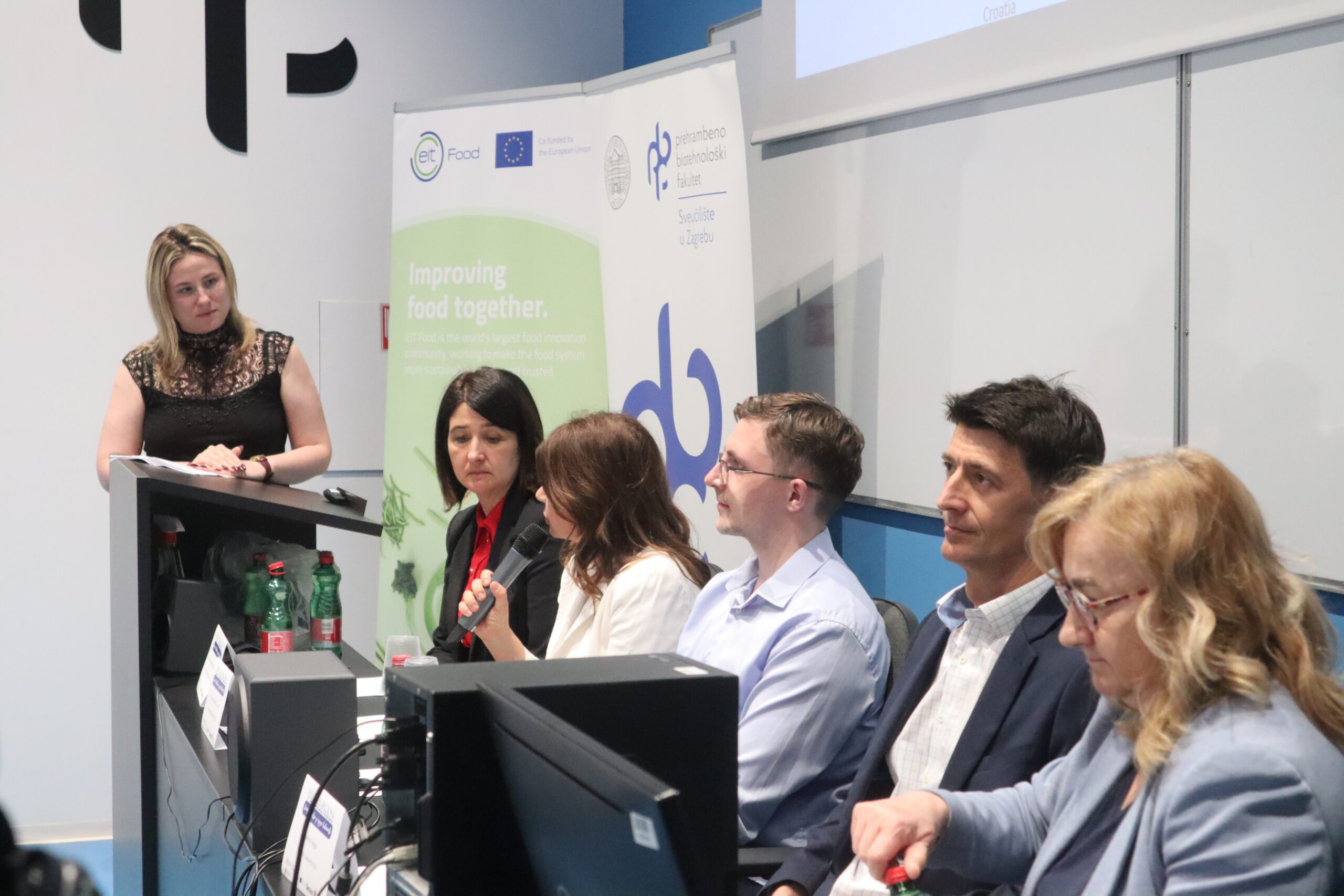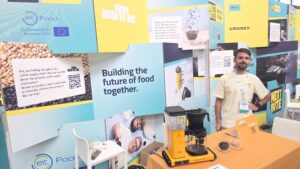A roundtable titled “Innovation, Sustainability, and Digital Transformation: The Future of the Food and Biotech Sector through the RIS3 Strategy” was held at the Faculty of Food Technology and Biotechnology, University of Zagreb (PBF).
Opening remarks were delivered by Prof. Verica Dragović Uzunović, PhD, Dean of PBF, and Prof. Ivana Radojčić Redovniković, PhD, Vice Dean for Science and International Cooperation, alongside Assoc. Prof. Tomislava Vukušić Pavičić, PhD on behalf of the EIT Food Hub Croatia. All three emphasized the role of the faculty as a knowledge centre – and the need for stronger collaboration with both industry and local communities, particularly through lifelong learning.
The panel was moderated by Maja Trstenjak, PhD (EIT Manufacturing Croatia), and featured voices from both academia and business: Prof. Ivana Radojčić Redovniković, PhD and Assoc. Prof. Bojan Žunar, PhD (both from PBF), Vesna Gabelica Marković, PhD (EIT Health Country Representative Croatia), Asst. Prof. Jelena Đugum, PhD (Croatian Chamber of Economy), and Lorens Flegar (Atlantic Cedevita d.o.o.).

Collaboration between academia and industry: potential and friction points
The panel opened with the question of how stronger collaboration between researchers and industry could speed up innovation. Ivana Radojčić Redovniković highlighted that faculties are hubs of knowledge and skilled teams capable of creating innovative solutions – but that research efforts need better alignment with real-world industry needs.
Lorens Flegar from Cedevita shared practical insights from the production side: while they’ve partnered with faculties on smaller projects, bigger leaps in technology are often risky and demand significant investment. One potential solution, he suggested, lies in more frequent meetups and dialogue – seminars, events, and networking sessions that encourage knowledge exchange and closer industry ties.
Bojan Žunar pointed out that communication often breaks down because “what we think is a problem, industry doesn’t necessarily see as one.” The only way to close that gap is through direct contact and co-defining the actual needs.
Interdisciplinary approaches and student involvement
Vesna Gabelica Marković shared examples of projects where students and early-career researchers developed solutions for real industry challenges. She also noted that while the Centre for Research, Development and Technology Transfer (CIRTT) holds plenty of promising ideas, turning them into reality depends on having the right resources. That’s why they’re actively strengthening ties through the EIT Food and EIT Health communities – to boost capacity and deepen collaboration.

Sustainability and green technologies in action
Sustainability challenges took center stage in the second half of the discussion. Jelena Đugum from the Croatian Chamber of Economy (HGK) noted that more and more companies are starting to see sustainability as a competitive advantage, though funding often remains a barrier. HGK supports businesses in navigating available funding sources – especially through the RIS3 strategy and EU mechanisms.
Lorens Flegar shared Cedevita’s own practices: all packaging materials are 100% recyclable, the company relies on renewable energy sources, and warehouse and production automation is becoming essential as a response to workforce shortages.
Bojan Žunar presented examples like the “Riba Hrvatske – Jedi što vrijedi” campaign and wine brands expanding into international markets through innovative strategies and smart positioning.
Digital transformation in the food sector
Looking ahead, the panel highlighted several key technologies shaping the next decade of food production: blockchain for food traceability, advanced automation, development of alternative proteins, and green tech solutions for waste reduction. Ivana Radojčić Redovniković noted that Croatian food companies are already developing animal-free products, as sustainability has become a top priority for younger generations of consumers.
The session wrapped up with an active Q&A, with attendees expressing the need for more events like this.
Final note
Beyond the panels, the roundtable created space for new connections, experience sharing, and potential future collaborations. Conversations continued long after the official program ended, underlining just how crucial these kinds of gatherings are for building a stronger innovation ecosystem.
The event was co-organized by the EIT Food Hub Croatia, led by innovation agency Smion and the Faculty of Food Technology and Biotechnology, University of Zagreb.
About the EIT Food Knowledge and Innovation Community
EIT Food is the world’s largest and most dynamic food innovation community. It drives innovation to build a future-fit food system that produces healthy and sustainable food for everyone.
A body of the European Union, invests in projects, organizations, and individuals who share its goals for a healthy and sustainable food system. It unlocks innovation potential in businesses and universities, creating and developing startups in the agri-food sector to bring new technologies and products to the market. It equips entrepreneurs and professionals with the skills needed to transform the food system, placing consumers at the center of its work by helping rebuild trust through reconnection with the sources of their food.
EIT Food is one of the nine innovation communities established by the European Institute of Innovation and Technology (EIT), an independent EU body founded in 2008 to promote innovation and entrepreneurship across Europe.





